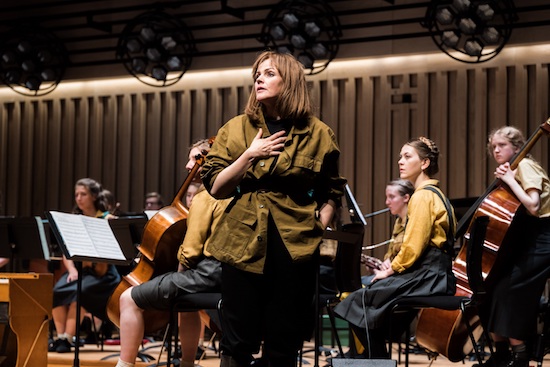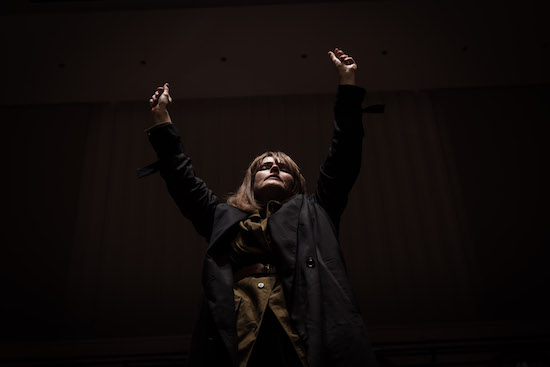Live photograph by Joseph Lynn
‘Famous, but not popular’ was the maxim often applied to Nico in her later years, usually by promoters keen to manage expectations for the next sparsely attended booking. Aside from the three songs on which she sang lead vocals for the Velvet Underground, her life story is much better known than her often challenging and relatively difficult solo work.
In her music and in her recreational pursuits, Nico favoured oblivion – but where did this compulsion come from? Answering this question is The Nico Project, a stage show led by actor Maxine Peake and director Sarah Frankcom, which premieres as part of Manchester International Festival, in the city that Nico called home on and off for seven years. The performance avoids any link with the city, instead focusing on her 1968 album the Marble Index.
The Marble Index is undoubtedly the artistic high point of Nico’s career – you can make a potent case, in fact, for it being the artistic high point of any of the musicians who came from the Velvet Underground nexus. Quite apart from its enigmatic beauty is the matter of the sheer emotional assault it makes on the listener.
It’s an atlas of depression; a tortured internal monologue mapped out by droning viola, clattering, discordant percussion, bells, pipes and glockenspiel, all underscored by the malevolent wheeze of Nico’s harmonium. Disappointed by the lack of creative control that she was able to exercise over her baroque folk debut album Chelsea Girl, Nico wrestled control of her output by choosing to work solely with John Cale – her former VU collaborator whose two compositions on Chelsea Girl were by some distance that album’s most difficult. In interviews from the time, Nico talked about the free jazz of Ornette Coleman (with whom she spent time) and the minimalism of Terry Riley. All of this goes in the pot with a haunting and atavistic, pre-Christian Europeanism.
The Nico Project begins with the hall’s house lights up, as Peake enters from the side of the stage. EV Crowe’s script, especially in Peake’s opening monologue, brings to mind the fragmented, stream-of-consciousness modernism of Eimear McBride – sentences unfinished, questions unanswered. There’s an exhausted inarticulacy to Peake’s Nico; all shaking hands, thick fringe and a wide-eyed stare pitched somewhere between terror and junkie blot-out. Though Nico spoke with a thick German accent, Peake wisely delivers the bulk of her lines in her native Bolton accent, leaving only the script’s most fevered moments to rise into Nico’s heavy dialect. As Peake stands alone on the stage, there’s a sense of proceedings being haunted as microphone feedback wails, and a chair leaps backwards of its own accord.
“A true story wants to be mine/ the true story is telling a true lie.” What we think we know about Nico is tricky; even the year and location of her birth is disputed. But what we do know is that as the Third Reich fell, she was living in Berlin with her mother. She remembered the city as a "desert of bricks", a decimated urban wilderness that, as she pointed out, "hides behind my lyrics like scenery". It’s an event from her formative years that The Nico Project puts front and centre – somewhere between the age of 13 and 15, Nico was raped by an American soldier. Allusions to this horrific event run through the performance until the play’s denouement.
If Nico and her haunted, difficult art was famous but not popular, where is her contemporary analog?
Consider Billie Eilish – perhaps the artist operating now who best mirrors the spirit of Nico’s work. Famous and astonishingly popular, Eilish’s music tracks a landscape not at all dissimilar to The Marble Index. Her 2019 album WHEN WE FALL ASLEEP, WHERE DO WE GO? carries much of the same sense of gnawing anxiety and dense, thickening claustrophobia. Bone-rattling basslines are for Eilish what foghorn drones were for Nico ("that sound" exclaims Peake’s Nico tonight as a drone sounds onstage, "that one, that sounds true".) Eilish’s imagery too is heavy on the gothic, her videos bleeding with spiders, ink black tears and needles. She projects much of the same listlessness too, a boredom and a barely suppressed darkness that provides much of the attraction for her audience. Eilish’s phenomena is to do all of this and win Teen Choice and Nickelodeon Kids awards.
In the same way that Nico’s seeming volte-face from Chanel model and Fellini muse to avant-garde auteur coloured critics’ perception of her, Eilish’s position as teen idol can seem similarly counter intuitive. There’s no good reason for this to be the case; unsettling records have been made by and for teens ever since the Brill Building was in full flow. But this comes down to what we expect of artists, specifically female artists, and this is something that Peake has made explicit in discussion around the show. “That’s what we’re intrigued with, when women are deemed not to be accessible” Peake explained to Loud & Quiet. “Men are seen as exotic and intellectual and exciting if they’re unlikeable, there’s something mysterious about them. But with a woman it’s quite different."

Live photograph by Joseph Lynn
Sarah Frankcom’s direction toys with Nico’s well-documented fascist sympathies. Thirteen young female musicians from the Royal Northern School of Music take to the stage, clad in Hitler Youth fatigues. Nico’s politics were perhaps complicated, but certainly unpleasant. Nico’s boss at Elektra Records, Danny Fields, claimed the singer was "both a Nazi, and as far from being a Nazi as you could possibly be". Be it from the right or the left, any grubby extremism would do. There are multiple testimonies of heavily racist outbursts. She dedicated songs onstage to notorious terrorist Andreas Baader of the Red Army Faction. In Berlin, a near riot was prompted by her performance of the German national anthem complete with verses banned after the fall of the Third Reich for their Nazi associations.
Neither is it too much of a stretch to find something völkisch in The Marble Index. It digs deep into a European folk memory, and on encountering the record for the first time much of its initial strangeness comes from quite how pre-rock its reference points and instrumentation is. Though this is well understood now, the few critics who covered the album at the time struggled to get a handle on these ideas – indeed, Lester Bangs curiously praised the record’s “futurism”, whilst Melody Maker deemed the album as belonging “somewhere around 1991”. If this was the future, then it would look an awful lot like the past. The album’s language is arcane too; its topography littered with references to statues, pillars, stone alters and heaving seas. She began at this time to reject the glamorous image associated with her fashion and Factory years, and affected a bohemian peasant chic that would endure until her death.
Anna Clyne’s arrangements tonight are largely faithful to those on The Marble Index – swelling from an amorphous kind of drift into fever staccato and back again, often within the same song. During Frozen Warnings, Peake crumples against the theatre wall, drawing short drags on a cigarette between tears. At one point, the venue is plunged into total darkness. The lights come back on, and the young musicians are contorted across the stage – led vertical over amps, twisting around chairs, arms held in exalted gestures. Its sheer strangeness matches that of the music. The most emotionally affecting moment of the show comes as Peake stands at the front of the stage holding the hand of one of the young musicians; forcing uncomfortable reflection on the central theme of the production. Evening Of Light takes on the momentum of a ritual, its wintry soundscape bolstered by propulsive kettle drums. All of the musicians standing on their chairs. Peake is stood high above the stage in the balcony. "I’m going to tell everyone what happened to me" she incants.
This gets, however, to the main flaw of this production. To be sure, it’s correct to match the bravery and experimentation of The Marble Index with a brave and experimental work – correct too, to frame Nico’s story for the first time around the trauma that she suffered. The problem is that the performance provides too little context. Clocking in at 55 minutes, there would have been room to be just slightly more explicit on the themes that frame the show – perhaps too much biographical knowledge is required of the audience for this framing to fully succeed. It makes the work appear more challenging for the audience than it actually is.
’Nibelungen’, the track left off The Marble Index on initial release, takes its name from an 11th century German epic poem. The Nibelungenlied takes in sacrifice, rape and revenge. Typifying the fantastical, deluded abyss into which the German high command had sunk, as the Third Reich began losing ground, Hermann Göring would quote the poem to celebrate the sacrifice of the German army and the German people. It’s an a cappella version of ‘Nibelungen’ that ends tonight’s show, the stage cleared of everyone but Peake.
“Since the first of you and me… the various defences… the telling numb… I cannot hear it anymore.”
Oblivion, and the roots of oblivion.


